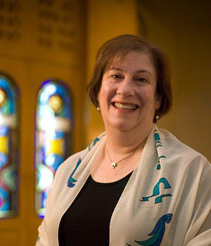By Donald H. Harrison

SAN DIEGO — Rabbi Laura Harari, a lifelong Jewish educator and a recently ordained rabbi, benefitted from both experiences. As a child, her “first real exposure” to Jewish life was through summer camping and informal education. She attended a Reform Jewish camp operated in Wisconsin by the Olin-Sang-Ruby-Union Institute. Later, she moved to Israel, where she met her husband, Rabbi Ze’ev Harari.
In between those formative experiences, Harari said, the late Rabbi Arnold Jacob Wolf must be credited for having ignited her “passion for learning.” She recalled how when she was a student, the rabbi led youth group retreats, teaching them on their weekends about Martin Buber. “I felt like I was coming home to myself,” she recalled.

Today Rabbi Harari commutes from her home in Laguna Hills in Orange County to serve as the principal of the new Community Jewish High School—started by three congregations in the wake of the closure of Hebrew High, which had been operated by the Agency for Jewish Education. Classes at the new school meet on Tuesday evenings.
Based at Temple Emanu-El and officially supported by that Reform congregation and two Conservative congregations—Ohr Shalom Synagogue and Tifereth Israel Synagogue—the new high school is developing a curriculum under her guidance.
Prior to the time that she became a rabbi herself, Harari, with master’s degrees in Judaica and Hebrew letters from Spertus College in Chicago, typically took education jobs in the communities served by her rabbi husband, now retired.
She had started a community high school previously in Evanston, Illinois, which brought together students from two Reform and one Reconstructionist congregation. She also had taught in a variety of locations including Minneapolis, Milwaukee, Haifa, Tel Aviv and Jerusalem.
She watched and kvelled as her daughter, Carmit Harari, also became a rabbi, now serving Congregation Beth Ora, in Edmonton, Alberta, Canada. Along the way, the wife, mother and teacher decided she would like to add the job of rabbi to her portfolio. She was ordained by Hebrew Union College in 2008.
“I didn’t become a rabbi to abandon Jewish education,” she said. “It was a personal goal.”
In discussing curriculum with fellow clergy — Rabbis Martin Lawson of Temple Emanu-El, Scott Meltzer of Ohr Shalom, and Leonard Rosenthal of Tifereth Israel – Harari said there was consensus that Judaism should be understood by students as a way “which people can live their lives.”
Harari said a curriculum was needed that could help overcome various trends that tend to weaken families’ connections with Judaism.
Among these are:
–The tendency to abandon religious studies after bar/ bat mitzvah.
–The tendency for Jewish college students to be turned off, or intimidated by the hostility on campus to Israel and by pro-Palestinian rhetoric.
–The tendency of college students to search other traditions for meaning, without really investigating the richness of their own Judaism. “Their own memory of Judaism is pediatric,” the rabbi said.
–The tendency on the part of more and more people to be “fee-oriented,” regarding their synagogues as institutions that provide purchasable services as opposed to institutions worthy of their commitment, support and devotion.
The rabbis developed a curriculum that includes:
For 8th and 9th graders, “sacred choices, which is a core course.” The class taught by Rabi Leonard Rosenthal, deals with “the issues that kids confront: body image, self image, sexuality, sexual ethics, relationship ethics, body piercing, tattooing, drugs and alcohol,” Harari said.
For 10th graders, the core course is “Kaballat Torah,” taught by Rabbi Martin Lawson, to help them prepare for religious confirmation.
For 11th and 12th graders, the core course involves a medley of Jewish issues, with a “round robin of rabbis—including Rosenthal, Lawson and Scott Meltzer – discussing issues of their choosing. Presently, Rabbi Lawson is focusing on comparative religions.
Students take their core course one period per evening, with the other period available for elective courses.
Kathy Kamin, who is education director at Temple Emanu-El, is teaching “Jewish cooking.” This is not simply a matter of leading students into a kitchen and whipping up a few ethnic dishes, Harari says. Instead the course uses cooking as a way to teach about the many communities and cultures Jews have influenced and been influenced by throughout world history.
Micah Glass-Siegel, similarly, is teaching the “art of Jewish paper cutting,” in which he uses this skill as a way to discuss worldwide Jewish culture. Glass-Siegel has a master’s degree from UCSD.
A third elective, still being developed, will involve utilizing Jewish music as another means for studying Jewish cultures throughout the world. Yet another possibility, said Harari, may be a course focusing on Jewish healing.
Last Tuesday, Oct. 12, was the first day of regular classes, although there had been an orientation session the week before that.
Harari said enrollments for eighth through twelfth graders at the Community High School are still open. The yearly fee—covering two semesters—is $618 per student. The rabbi can be reached for more information via email at laurah@cjhsd.org
*
Harrison is editor of San Diego Jewish World